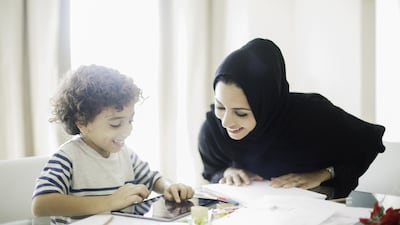Abu Dhabi has launched a drive to help Emirati families adopt young children in an effort to provide a vital lifeline to those left without parental care.
The emirate's Department of Community Development outlined wide-ranging plans to streamline the adoption process, with an emphasis placed on supporting children aged 2 and over and those with disabilities.
The strategy was announced during a panel discussion on Tuesday, which coincided with the annual International Adoption Day.
During the talks, Emirati women who adopted children shared their experiences and emphasised the importance of offering a loving home to those in need.
“Our wise leadership has been keen to provide full support to children deprived of parental care, to find the best ways to enable them to fully integrate into the family and society in a safe and stable home environment, and to ensure the fulfilment of the department's aspirations to establish an integrated, cohesive and inclusive society for its various beneficiaries,” said Dr Bushra Al Mulla, executive director of the department's Community Development Sector.
Authorities are stepping up efforts to protect the family unit and forge a more inclusive society.
President Sheikh Khalifa, in his capacity as Ruler of Abu Dhabi, issued a law in September to establish the Family Care Authority.
It will aim to assess the needs of families in the capital and provide services to improve their quality of life.
Members of the authority will undertake research into family care and propose legislation aimed at bolstering family care services.
“Based on DCD’s mandate and following the announcement of the establishment of the Family Care Authority, an integrated system will be developed according to best international practices and standards to organise the process of adopting children of different ages deprived of parental care,” Dr Al Mulla said.
This will be done by providing "the necessary support to Emirati families for adopting them, especially children of determination and those aged 2 years and above", she said.
The new adoption model will provide a key support network to prospective parents, helping to grant temporary guardianship of children before formal adoption.
The organisation will continue to assist people in adapting to a new family setting once adoption is approved.
Peer-to-peer support groups will be set up to allow potential foster parents to meet other families who have been through the adoption process.
Programmes will also be established to help prepare Emirati families for the challenges ahead.
The DCD said the new policies were part of a wider effort to improve quality of life for all sections of society.

